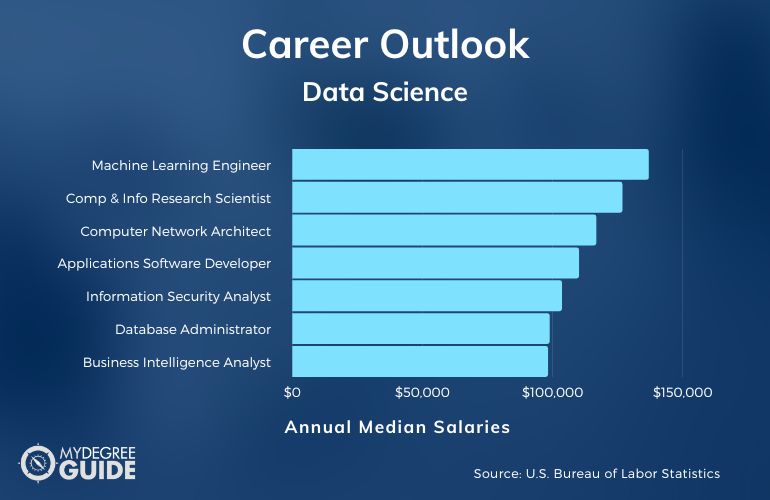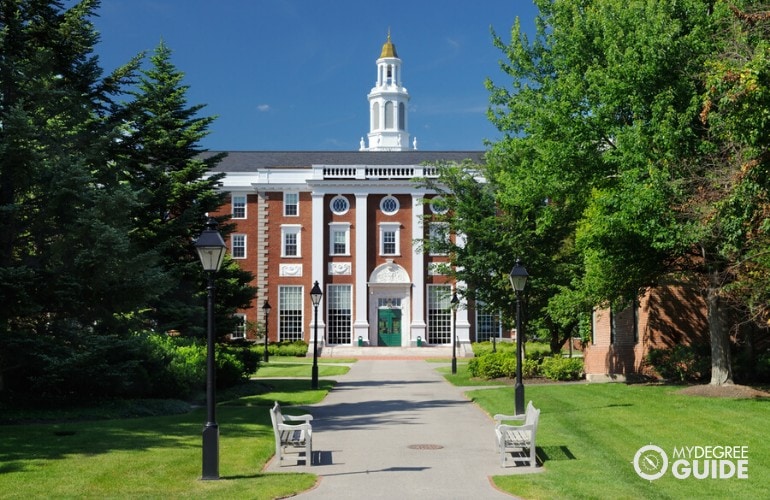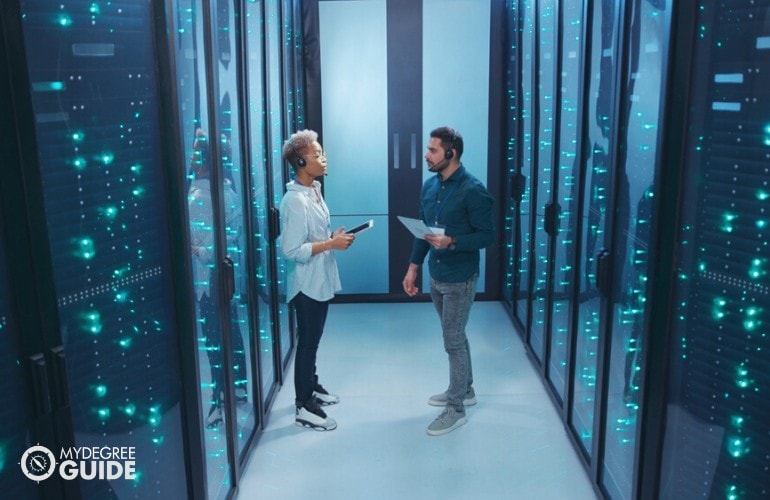Explore Data Science Programs online for 2024. Compare online degree programs, career paths, and salary data.

The best data science programs online combine theoretical concepts with real-world skills and practicums.
Editorial Listing ShortCode:
They may teach you what you need to know about the industry, and they can help prepare you for jobs in data management, information systems, software engineering and more.
Universities Offering Online Data Science Master’s Degree Programs
Methodology: The following school list is in alphabetical order. To be included, a college or university must be regionally accredited and offer degree programs online or in a hybrid format.
1. Bay Path University
Bay Path University offers bachelor’s degrees for women at its four Massachusetts campuses and online. In addition, the school’s graduate program extends master’s degrees to both men and women.
The school’s digital branch, known as the American Women’s College, was the first all-female online degree program in the U.S. This private university was founded in 1897.
- MS in Applied Data Science
Bay Path University is accredited by the New England Commission of Higher Education.
2. Bellevue University
Bellevue University in Nebraska offers online and on-campus bachelor’s, master’s and doctoral degrees. The school opened in 1966 and is a private institution.
To help students acquire skills that will make a genuine difference in the workplace, Bellevue relies on a Real Mastery approach to education with real-world case studies and practice situations.
- MS in Data Science
Bellevue University is accredited by the Higher Learning Commission.
3. Cabrini University
Cabrini University has been educating students since 1957. More than 40 different degrees are available at the bachelor’s, master’s and doctoral levels. In addition to studies on the Pennsylvania campus, students can also pursue some degrees online.
Cabrini is a private Catholic institution but is open to students of all faith backgrounds.
- MS in Data Science
Cabrini University is accredited by the Middle States Commission on Higher Education.
4. Colorado Technical University
Colorado Technical University runs two campuses and offers a robust lineup of online degrees at all undergraduate and graduate levels.
U.S. News and World Report has repeatedly ranked CTU as one of the best schools for veterans who are pursuing online degrees. This private university has been operating since 1965.
- MS in Computer Science – Data Science
Colorado Technical University is accredited by the Higher Learning Commission.
5. Davenport University
Founded in 1866, Davenport University was one of Michigan’s first colleges. Over 150 years later, DU now runs 14 campuses and an online program. Students can earn a baccalaureate degree or a master’s degree from this private institution.
There are around 60 different degree programs, and more than 7,000 students are currently enrolled.
- MS in Data Analytics
Davenport University is accredited by the Higher Learning Commission.
6. DePaul University
DePaul University is the biggest Catholic university in the U.S. This private Illinois institution serves around 22,000 students each year. DePaul issues bachelor’s, master’s and doctoral degrees, and the school also offers associate’s degrees in conjunction with Harold Washington College.
The first group of DePaul students began classes in 1898.
- MS in Data Science
7. Drexel University
Drexel University is a Pennsylvania research school that first opened in 1891. Approximately 25,000 students enroll annually, and around 20% of them take classes online. Drexel offers bachelor’s programs as well as master’s and doctoral graduate programs.
This private institution is divided into 15 different colleges and schools, including the College of Computing and Informatics.
- MS in Data Science
Drexel University is regionally accredited by the Middle States Commission on Higher Education.
8. Elmhurst College
Elmhurst College, soon to be Elmhurst University, is a private school associated with the United Church of Christ and open to people of all faiths.
This Illinois college first opened in 1871. Students can pursue one of about 60 bachelor’s degrees or enroll in one of Elmhurst’s 17 master’s degree programs.
- Master’s in Data Science
Elmhurst College is accredited by the Higher Learning Commission.
9. George Mason University
George Mason University is one of Virginia’s institutions of public education. Open since 1972, GMU has two Virginia campuses and a location in South Korea.
The university’s 10 different colleges and schools, such as the Schar School of Policy and Government and the School of Business, issue bachelor’s, master’s and doctoral degrees.
- MS in Data Analytics Engineering
George Mason University is accredited by the Commission on Colleges of the Southern Association of Colleges and Schools.
10. Johns Hopkins University
Johns Hopkins University, located in Maryland, has been educating students since 1876. Today, it is one of the nation’s preeminent research institutions and has been affiliated with 29 Nobel laureates.
Bachelor’s, master’s and doctoral degrees from this private university, whether earned on campus, online or through a hybrid approach, are highly respected.
- MS in Data Science
Johns Hopkins University is accredited by the Middle States Commission on Higher Education.
11. Lewis University
Lewis University in Illinois features a student-faculty ratio of 13:1 for its 6,400 students. This private Catholic school, founded in 1932, is associated with the De La Salle Christian Brothers.
Most academic programs at Lewis are for bachelor’s and master’s degrees, but a few doctorates are available as well.
- MS in Data Science
Lewis University is accredited by, and a member of, the Higher Learning Commission.
12. Merrimack College
Merrimack College is a private postsecondary institution in Massachusetts. Rooted in the Catholic tradition, Merrimack values the pursuit of truth. The college opened in 1947. Today, in addition to on-campus classes, students can take courses online.
There are approximately 100 programs, including bachelor’s and master’s degrees, from which students can select.
- MS in Data Science
Merrimack College is accredited by the New England Commission of Higher Education.
13. National University
Founded in 1971, National University is a network of nonprofit educational institutions headquartered in San Diego, CA. It is dedicated to providing flexible, quality education for busy adults. It offers a wide variety of programs for bachelor’s, master’s, and doctoral degrees.
- MS in Data Science
National University is regionally accredited by the Western Association of Schools and Colleges.
14. Oklahoma State University
Oklahoma State University has five campuses throughout the state of Oklahoma. This public university system also offers online programs. In addition to bachelor’s programs, OSU offers more than 80 master’s programs and nearly 50 doctoral ones.
At the Stillwater campus, which was established in 1890, there’s a student-faculty ratio of 20:1.
- MS in Business Analytics and Data Science
Oklahoma State University is accredited by the Higher Learning Commission.
15. Regis University
Regis University is a private Jesuit Catholic school in Colorado. The institution has roots dating back to 1877. Today, the university offers bachelor’s, master’s and doctoral degrees.
In addition to offering online and on-campus studies, Regis also serves marginalized learners in countries around the world through the Jesuit Worldwide Learning program.
- MS in Data Science
Regis University is accredited by The Higher Learning Commission.
16. Rochester Institute of Technology
Rochester Institute of Technology, a private school, began educating students in 1829. The main campus is in New York, and there are also several worldwide campuses as well as online programs. More than 15,000 undergraduates are currently enrolled.
RIT offers bachelor’s, master’s and doctoral degrees and also has associate’s programs for deaf and hard-of-hearing students.
- MS in Data Science
Rochester Institute of Technology is accredited by the Middle States Commission on Higher Education.
17. Saint Mary’s College
Saint Mary’s College in Indiana issues bachelor’s, master’s and doctoral degrees. The undergraduate programs are for women only, but the graduate school is for both men and women.
This private Catholic college has about 1,600 students and a student-faculty ratio of 10:1. St. Mary’s first opened in 1844.
- MS in Data Science
Saint Mary’s College is accredited through the Higher Learning Commission.
18. Southern Methodist University
Southern Methodist University confers around 4,000 degrees at the bachelor’s, master’s and doctoral levels each year. The school, a private institution in Texas, was founded in 1911 and now enrolls around 12,000 students annually.
Associated with The United Methodist Church, SMU embraces diversity and welcomes learners of all religious backgrounds.
- MS in Data Science – Business Analytics
- MS in Data Science – Machine Learning
Southern Methodist University is accredited by the Southern Association of Colleges and Schools Commission on Colleges.
19. Syracuse University
Syracuse University has been educating students in New York since 1870. Over the last 150 years, this private university has expanded to three additional campuses. Students can earn bachelor’s, master’s and doctoral degrees on campus, and they have options for associate’s, bachelor’s and master’s degrees online.
They may also study abroad in one of 60 different countries.
- MS in Applied Data Science
Syracuse University is accredited by the Middle States Commission on Higher Education.
20. University of Illinois at Urbana-Champaign
The University of Illinois at Urbana-Champaign educates more than 33,000 undergraduates and over 15,000 graduate students each year. This school ranks in the top 20 in the U.S. for the number of doctoral degrees it confers (National Center for Education Statistics).
Bachelor’s and master’s degrees are also available. The U of I, a public university, opened in 1867.
- Master of Computer Science in Data Science
The University of Illinois at Urbana-Champaign is accredited by the Higher Learning Commission.
21. University of Missouri
The University of Missouri boasts more than 300 programs of study, including bachelor’s, master’s and doctoral degrees. 92.7% percent of the faculty at this public university hold terminal degrees in their fields, and one is a Nobel laureate.
The school was founded in 1839 and has more than 330,000 living alumni.
- MS in Data Science and Analytics
The University of Missouri is accredited by the Higher Learning Commission.
22. University of Notre Dame
The University of Notre Dame is a private postsecondary institution that’s affiliated with the Catholic Church. The school, founded in 1842, offers 75 majors for bachelor’s degrees. Notre Dame confers master’s degrees and doctorates as well.
The university’s divisions include the Keough School of Global Affairs and the School of Architecture.
- MS in Data Science
The University of Notre Dame is accredited by The Higher Learning Commission.
23. University of Southern California
At the University of Southern California, about 42% of the 48,500 students are working toward bachelor’s degrees. The remaining 58% are enrolled in graduate studies, such as master’s degrees, professional doctorates and PhDs.
A private university, USC was founded in 1880 and now includes more than 20 schools and colleges.
- MS in Applied Data Science
- MS in Computer Science – Data Science
USC is accredited by the Western Association of Schools and Colleges.
24. University of Virginia
Multiple publications, including Forbes and Money, have named the University of Virginia one of the country’s best-value schools. Begun by Thomas Jefferson, UVA has been providing postsecondary education since 1819.
This public university offers bachelor’s, master’s and doctoral degrees. UVA is particularly well known for its Darden School of Business.
- MS in Data Science
University of Virginia is accredited by the Commission on Colleges of the Southern Association of Colleges and Schools.
25. Western Governors University
Western Governors University offers bachelor’s and master’s degrees in the fields of business, education, information technology, health and nursing. WGU is based in Utah but offers its programs fully online.
This private school was founded in 1997 by a group of state governors who shared a goal of using technology to make education more accessible.
- MS in Data Analytics
Western Governors University is regionally accredited by the Northwest Commission on Colleges and Universities.
Online Master’s in Data Science Programs
Like its name suggests, data science revolves around data. It’s the foundation of just about every business out there.
Click on the program that most interests you to jump to that section of the guide:
Depending on your school, these subjects might be taught separately or together. There can be a lot of overlap between them, so don’t be surprised if your data science degree program draws from different disciplines like computer science and information technology (IT).
Online Master’s in Data Science

This is the general study of data science. It’s frequently offered as a Master’s in Data Science (MSDS), but you might also find it as a Master’s in Applied Data Science or even a Master’s in Data Analytics.
It gets called data analytics because that’s one of the core concepts that you’ll study in the program. From collecting and organizing information to analyzing and storing it when you’re done, analytics play a huge role in data science.
Editorial Listing ShortCode:
That said, you don’t have to focus on analytics if you’re interested in other things. If you’re the creative type, you might want to learn app or software development. If you get satisfaction from crunching numbers, you may become a data miner or statistician.
If you like to code, you might want to study programming languages and build systems from the ground up.
You may have plenty of options with a data science degree. It’s such a broad area of study that its degree may be applied to many different jobs and industries.
Online Master’s in Business Intelligence

Business intelligence has many different definitions, but fundamentally, it’s about translating raw data into actionable data. It’s looking at a spreadsheet and figuring out the how, where and why of the numbers and determining what the company can do with them.
Business intelligence is sometimes known as data intelligence, data analytics or business analytics. While there are key differences in these subjects, there’s enough crossover that some colleges don’t bother to make the distinction. Speaking very generally, a data analytics degree is usually the same thing as a business analytics degree.
Editorial Listing ShortCode:
Where does data science fit into it? Depending on your school, you could major in data science and minor in something like business intelligence. Another possibility is getting your bachelor’s degree in business intelligence and your master’s in data science online or on-campus.
Again, you may have options. Data science is a vast and varied subject, and what’s more, it’s always evolving. It’s a technology-based discipline where things can change quickly.
Data Science Curriculum and Courses

Data science is such a broad field that there isn’t really a typical course list. However, you’ll probably see some repeating subjects in different college catalogues:
- Foundations of Data Science: This is an entry-level course in data science programs that can teach you the basics of the subject and how they’re applied to businesses and enterprises.
- Programming: These classes are sometimes classified as “Programming for Data Science.” They’ll teach you languages like Python, R, Java and SQL.
- Data Mining: Data mining is the art of finding and extracting small amounts of data from a much larger system. It requires both technical skills and an academic understanding of how these systems work and how you can work within them.
- Analytics: This is a wide-ranging topic with many different subsets, including predictive, descriptive and diagnostic analytics.
- Strategic Decision Making: Many careers in data science require problem-solving and decision-making. These courses can show you how to assess risks, handle crises and make decisive judgements.
- Statistics: You can take basic statistics classes as an undergrad, and once you’re working towards a master’s degree, you can advance to more complex subjects like statistical modeling and computing.
- Big Data: “Big data” is a term that refers to the gigantic amounts of data that can be generated by a business on a daily basis, and these classes can teach you how to manage, store, transmit, organize and contain it.
- Cybersecurity: What are the best ways to avoid malware? Do you know how to protect networks and servers from hackers? Cybersecurity classes are essential for anyone who will be working with sensitive data.
- Computer Science: Most data science degree programs require a certain number of computer science classes, but their specifics will depend on your degree concentration. For example, you might choose to focus on networks, databases, algorithms or hardware.
- Capstone: It’s common for data science programs to require a capstone project to showcase everything that a student has learned.
Just remember that data science courses can vary from student to student. This is especially true if you’re specializing in something on a postgraduate level.
Your schedule as a future programmer might look completely different than a classmate who wants to be an information systems manager, so even though you’re both getting a master’s degree in data science, your academic trajectories will go in separate directions.
Data Science Careers and Salaries

According to the U.S. Bureau of Labor Statistics, the field of computer and information technology is expanding by the day. Almost 531,200 jobs will be created within the next decade, and the overall growth rate of the industry is 11%, which is much faster than the national average.
What kinds of jobs will be available to data science majors? It depends on your skills, interests and professional certifications.
Many data science students become analysts of some kind. If you’re good with numbers, you might like data analysis, statistical analysis or something specialized like business systems analysis.
You may also focus on a particular area of computers or computer systems. For example, you may apply your data science skills to databases, networks or servers. You may build hardware or design software. These job titles usually have descriptors like architect, designer, engineer and developer.
If you want to specialize, there are also niche jobs in things like business intelligence (BI) and machine learning (ML). Another option is to devote yourself to big data, cybersecurity or information technology. These are expansive fields that may take you down many different paths.
As for your pay, data science jobs can have very high salaries. They aren’t a guarantee, of course, but the averages speak for themselves:
| Careers | Annual Median Salary |
| Machine Learning Engineer in Systems Design | $136,950 |
| Computer and Information Research Scientist | $126,830 |
| Computer Network Architect | $116,780 |
| Applications Software Developer | $110,140 |
| Information Security Analyst | $103,590 |
| Database Administrator | $98,860 |
| Business Intelligence Analyst | $98,230 |
| Computer Systems Analyst | $93,730 |
| Computer Programmer | $89,190 |
| Web Developer | $77,200 |
Some salaries are even higher than the ones on this list. For example, the $126,830 figure for computer research scientists is just the median. The highest earners take home a whopping $194,430 per year.
Data Science Accreditation

It’s very important to choose an accredited college when looking at data science degrees. Accredited colleges have been reviewed and vetted by third-party organizations like the U.S. Department of Education or the Council for Higher Education Accreditation. They’re real, non-scam universities that have proven their educational standards.
Unaccredited colleges aren’t automatically bad, but many of them aren’t accepted in collegiate networks, and many employers won’t take their degrees seriously. You might also struggle to get financial aid for an unaccredited college.
Here are the six names to look for in accreditation:
- Northwest Association Of Schools And Colleges
- Southern Association of Colleges and Schools
- Western Association of Schools and Colleges
- Middle States Commission on Higher Education
- New England Association of Schools and Colleges
- Higher Learning Commission
These are considered “regional” accreditation since they divide the country into regions. There’s also “national” accreditation for trade schools and “programmatic” accreditation for specific degree programs, but regional accreditation is the most common.
If you’re confused by the different kinds of accreditation, just go to the website for the DOE or CHEA and search their databases for your chosen school.
They have complete lists of every school that they’ve accredited, so it’s just a matter of plugging in a name and seeing their credentials.
Data Science Professional Organizations

Professional organizations are basically networks for people within the same field.
They can look good on a resume, and they provide resources for both students and working professionals that may include job boards, academic journals, networking events, certification programs and continuing education courses.
You don’t have to join a professional organization to be successful. However, it may be worth the effort to check them out and see what they have to offer.
Here are just a few organizations that might interest you as a data science student:
- Association for Information Science and Technology: Known as ASIS&T, this organization is a treasure trove of legal, financial and practical resources for information science. Membership is divided into different tiers like “student,” “early career,” “professional” and “retired.”
- International Association for Social Science Information Services and Technology: IASSIST is dedicated to data, tech, business, analytics and social science. It puts out a quarterly journal and has an annual conference for professionals in the field.
- Association of Information Technology Professionals: The AITP is for anyone in the field of information technology (IT). It offers several different certifications in things like cybersecurity and network management, and it also has classes and training programs for the workplace.
These aren’t the only organizations that welcome data science majors, so don’t be afraid to look around and find others. Many associations offer discounted membership rates to students.
Financial Aid

The cornerstone of financial aid is the Free Application for Federal Student Aid (FAFSA). Like its name suggests, it’s completely free, and it may offer several different types of assistance:
- A grant is financial aid money that doesn’t have to be paid back. The most common is the Federal Pell Grant, but there’s also the Iraq and Afghanistan Service Grant and the Teacher Education Assistance for College and Higher Education (TEACH) Grant.
- A loan has to be paid back, but if you’re considered a low-income student, you might qualify for a subsidized loan where the interest is paid by the government while you’re in school. If not, you can always apply for an unsubsidized loan. Those are generally open to everyone.
There are other forms of financial aid to consider, too. You may apply for a work-study program on campus; you can ask your employer if they offer tuition reimbursement.
Another option is scholarships. They can be either “need-based” or “merit-based,” so don’t brush off the possibility of getting one just because you don’t fit the model of a typical scholarship student. You may find scholarships for all sorts of things, including data science degree programs.
Some of the larger funds can offer up to $25,000 for multiple years of schooling.
Data Science Open Courses

If you’re interested in taking Open Courses in Data Science, here’s a list to get you started:
- A Crash Course in Data Science (Johns Hopkins University)
- Applied Data Science with Python (Udemy)
- Applied Data Science with Python Certification (University of Michigan)
- Applied Data Science: An Introduction (Syracuse University)
- Berkeley Program on Data Science and Analytics (U.C. Berkeley Executive Education)
- Data Science and Machine Learning Bootcamp (Udemy)
- Data Science Certification from Harvard University (edX)
- Data Science Master’s Degrees Online (Coursera)
- Data Science MicroMasters Certification by U.C. San Diego (edX)
- Data Science Online (Berkeley ExecEd)
- Data Science Orientation (edX)
- IBM Data Science Certification (Coursera)
- Introduction to Data Analysis (Udacity)
- Introduction to Data Science (Udemy)
- Machine Learning Certification by Stanford University (Coursera)
- MIT Data Science and Statistics Certificate (edX)
- Professional Certificate in Applied Data Science (Dartmouth College)
- Python for Data Science and Machine Learning Bootcamp (Udemy)
- The Data Scientist’s Toolbox (Johns Hopkins University)
Although these courses will give you instruction in data science, the majority will likely not carry the same weight as an official master’s degree in data science.
What are the Best Online Courses for Data Science?

You’ll have to make your own judgments about the best online programs for data science. However, there are definitely a few factors that you should look at before making a final decision:
- Tuition
- Accreditation
- Courses, degrees and specializations
- Online learning resources
- Required credits
- Acceleration options
If you have any questions about these things, don’t hesitate to reach out to the school in question.
Which Data Science Certification is the Best?

There are many different data science certificate programs. Some offer self-paced learning from online courses; others will require you to attend a local university; others still are “hybrid” courses with both digital- and classroom-based study.
As for the titles, they can vary:
- Certified Analytics Professional (CAP)
- Google Certified Professional Cloud Architect (GCP Cloud Architect)
- Certified Big Data Professional (CBDP)
- Data Science Council of America (DASCA) Principle Data Scientist (PDS)
- Microsoft Certified Solutions Expert (MCSE)
Certification programs can last from weeks to months.
Depending on the skills that they teach and the institution that’s offering them, their prices can range from around $150 – $1,000.
Can I Learn Data Science Online?

There are plenty of online degree programs for data science. They might go by other names, or they might focus on something specific like business intelligence or data analytics, but they’re available at every level of study.
Whether you’re interested in associate programs or PhD programs in data science, you may find an online program for data science.
Is a Data Science Certificate Worth It?
The value of a data science certification may depend on what you’re trying to accomplish with it.
If you want to land a high-paying job, it might not help. Many data science occupations require a master’s degree or higher, including computer scientist and computer systems analyst. A certificate doesn’t usually hold the same weight as a graduate degree.
However, there are entry-level jobs and internships where a certificate might come in handy. You may also become a certified professional in a particular skill if you want to boost your employability even as an advanced degree holder.
It never hurts to have extra talents on your resume, especially if you’re applying for niche jobs where niche skills are valued.
What is Data Science?

Data science is the study of data. Everyone uses it, including doctors, scientists, educators, marketers and business professionals. Whether it’s collecting patient information in a database or analyzing trends and statistics to predict the stock market, data is the lifeblood of the modern organization.
The purpose of data science is to utilize all of this information. Instead of letting raw data just collect and gather dust, data science finds it, mines it and organizes it for future use by an individual or company. It takes information and turns it into action.
Do You Need a Master’s Degree to be a Data Scientist?
Many jobs in data science require a master’s degree. It isn’t required by law, but employers expect it, and applicants might find themselves edged out by more qualified candidates if they only have a two- or four-year degree.
However, data science is a fast-paced industry by nature. Skills and standards are always evolving. It’s possible to find data science jobs even without a master’s degree, and who knows if that will become even more common in the future?
What is Big Data?

Big data refers to large volumes of data that can’t be tracked, organized or analyzed by traditional software. It can be a problem for corporations that need to process millions and millions of terabytes on a daily basis.
You may big data as part of your data science degree, or you may specialize in it with concentrations and certifications.
Colleges don’t offer a degree in the subject, but it’s commonly offered as a class for computer or technology majors.
How Long Does it Take to Get a Master’s in Data Science?

It usually takes around two years to complete a master’s degree. However, you might be faster or slower to graduate depending on things like:
- Course load: How many credits are you taking per semester? Are you working through the summer as well?
- Acceleration: Some schools offer dual degree programs that will allow you to obtain your bachelor’s and master’s degree in five years rather than six.
- Specialization: It can take anywhere from 30 – 45 credits to earn a master’s degree in data science, computer science, information technology or business analytics.
Generally speaking, you should expect to spend anywhere from 1 – 3 years in school to get a master’s degree.
What Can I Do with a Master’s in Data Science?

A master’s degree in data science may qualify you for work in many different fields. If you’re happy to sit behind a desk, you may become an analyst, programmer, computer scientist or database administrator.
If you prefer more creative work, you may become a web developer, software engineer or applications architect. You may even take a road less traveled and become a statistician or economist with a focus on data science.
Is a Master’s Degree in Data Science Worth It?
Yes, a master’s degree in data science is worth it for many students. The Bureau of Labor Statistics is projecting 11% job growth in computer and information technology occupations over the next 10 years. Common careers in this field include computer systems analyst, business intelligence analyst, information security analyst, and data scientist.
A data science degree can be a wise investment for the future. The industry will add more than 531,200 jobs in the next decade.
It’s worth at least checking out data science degree programs online.
Getting Your Data Science Degree Online

Data science is a highly technical field that may require a lot of dedication and intelligence. The good news is that online programs are making it easier than ever to get your degree.
If you think that data science might be your calling, start looking into university programs and seeing what they have to offer.
